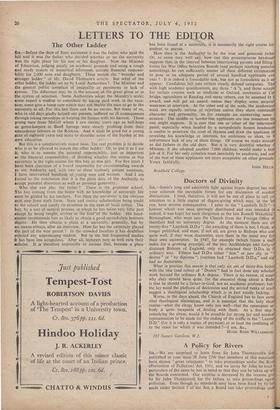LETTERS TO THE EDITOR
The Other Ladder
Ent,—Before the days of State assistance it was the father who paid the bill and it was the father who decided whether or no the university was the right place for his son or his daughter.' Now the Minister of Education, judging purely on academic grounds and using .a rough and ready system of numerical allotment, accepts financial responsi- bility for 2,000 sons and daughters. These mount the " broader and stronger ladder" of Mr. David Thomson's article. But what of the other ladder, the ladder set up by Local Authorities ? The Minister and the general public complain of inequality or parsimony or lack of system. The difference may be in the amount of the-grant given or in the system of selection. Some Authorities adopt the Ministry's scale; some expect a student to contribute by taking paid work in the vaca- tion; some give a lump sum which may not enable the man to go to the university at all. For this last there can be no excuse. But many of us, who in old days gladly helped our parents, suffered no ill consequences through taking tutorships or helping the farmer with his harvest. Those young men from McGill whom I saw twenty years ago as bell-hops or green-keepers at Banff Springs were clearly profiting from their unacademic labours in the Rockies. And it must be good for a young ;nail of eighteen years and more to shoulder some of the burden of his own education.
But this is a comparatively minor issue. The real problem is to decide who is to be allowed to mount the other ladder. Or, to put it as I see it, who is to assume the parental responsibility, just as important as the financial responsibility, of deciding whether this course at this university is the right course for this boy or this girl. For five years I have been chairman of a board responsible for recommending awards to our Authority and, with two or three tirelessly patient assistants, I have interviewed hundreds of young men and women. And I am forced to the conclusion that it is the plain duty of the Authority to accept parental discretion as well as parental generosity.
Who else can play the father ? There is the grammar school. The boy coming from the home with no knowledge of university life' roust be guided by his teachers. For them the university is the obvious next step from sixth form. State and county scholarships bring credit to the school and justify its existence in the eyes of local critics. The boy, by a sort of natural process, in which he has taken very little part except by being taught, arrives at the foot ''of the ladder. His head- master recommends him as likely to obtain a good second-class honours degree. He then obtains a place at a university, generally, but by no means always, after an interview. How far has the university played the part of the wise parent ? In the crowded faculties it has doubtless rejected any unpromising student. But in the less frequented studies it has been less scrupulous. After all, lecturers may as well earn their salaries. It is therefore impossible to assume that, because a place
has been found at a university, it is necessarily the right course for student to pursue.
How then is the Authority to be the wise and generous fathe Or, as some may well say, how can this presumptuous headmas suppose that, in the interval between interviewing parents and filling forms for War Office Selection Boards (and perhaps teaching somebo something), he can sufficiently master all these different circumstan to pose as an adequate parent of several hundred applicants ev year ? It is indeed a formidable task, but not as formidable as it in appear. Candidates fall into certain clearly defined categories. Tho with high academic qualifications, say three " A "s, and those accept for certain courses such as medicine at Oxford,. mechanics at Cart bridge, agriculture at Reading and many others, can be assumed fit f( award, and will get an award, unless they display some surprisir weakness at interview. At the other end of the scale, the academical' weak are equally certain of rejection unless they show outstandir character and personality, 'as for example an unswerving sense mission. The middle or border-line applicants are less numerous tiv one might suppose. It is rare that one or other of the interviewir panel, especially when briefed by a scrupulously honest headmastc is unable to penetrate the crust of shyness and draw the applicant id revealing his knowledge or interests, his ambitions or ideas, or III unfortunate lack of any of these things. Of course we make mistake as did fathers in the old days. But it is very doubtful whether tt Minister, if she adopted another 7,000 children, would make a betty job of it. For her only criterion must inevitably be academic, and man of the best of these applicants are more acceptable on other grounds;-- Yours faithfully,
Bradfield College. JOHN HILLS


























































 Previous page
Previous page